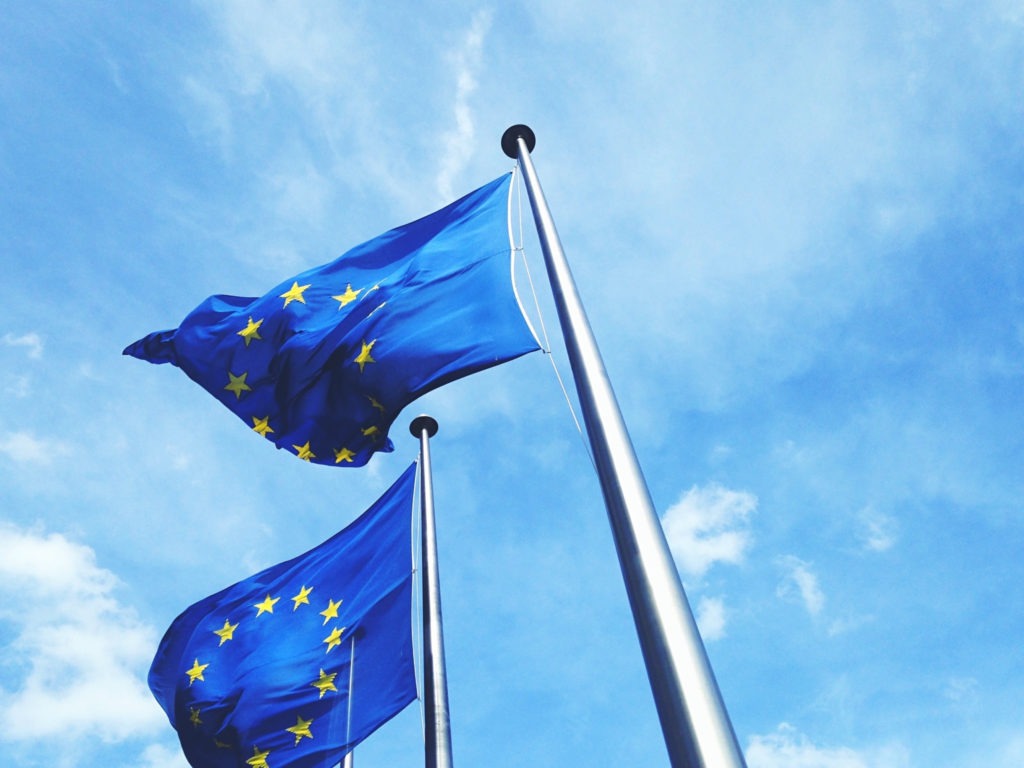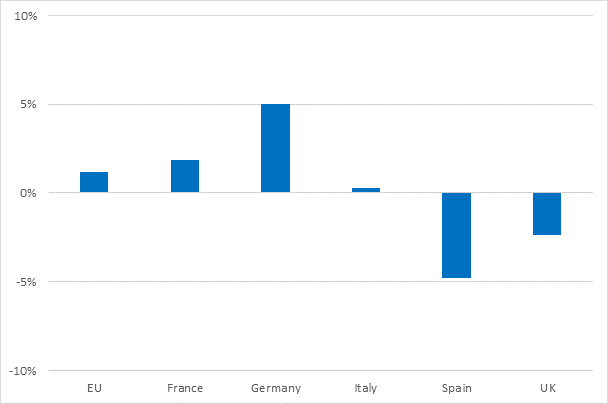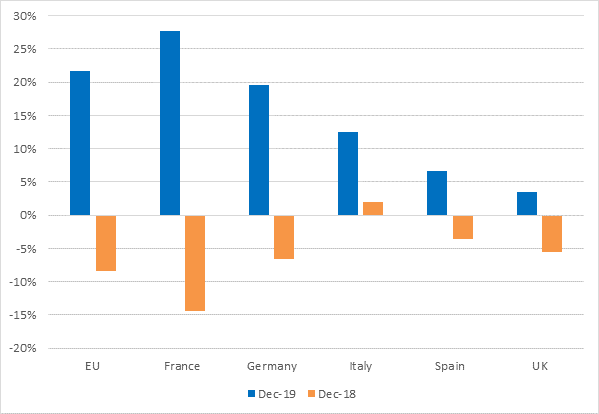EU new-car market up in 2019 after December surge
16 January 2020

16 January 2020
Autovista Group Senior Data Journalist, Neil King, considers the surge in new-car demand across the EU in December, which pushed the whole year into positive territory in 2019.
New-car registrations in the EU grew by a staggering 21.7% year-on-year in December 2019, resulting in full-year registrations coming in 1.2% higher than in 2018, according to data released today by the European carmakers’ association, ACEA. The EU new-car market was still 0.3% lower in the first 11 months of 2019 than in the same period in 2018 but growth in December was expected by Autovista Group to result in 2019 coming in higher than 2018.
Through to November, Germany was the only one of the five major European car markets to record growth but the strong December results also turned France and Italy positive for full-year 2019, as predicted.
New-car registrations in Germany expanded by 19.5% in December 2019, resulting in annual growth of 5%. However, the Germany December result was significantly surpassed in France, where new-car demand rose 27.7%, resulting in full-year growth of 1.9%. Similarly, 12.5% growth in Italy in December was enough to drive the full-year figure into positive territory, albeit with growth of just 0.3% in 2019. Spain and the UK suffered the greatest contractions in demand in 2019 and respective growth of 6.6% and 3.4% in December was insufficient to counteract the weakness throughout the year. New-car registrations were 2.4% lower in the UK than in 2018 and the Spanish market contracted by 4.8% in 2019.
New-car registrations, year-on-year % change, 2019
 Source: Autovista Group based on ACEA data
Year-end growth spurt was expected
Growth in new-car registrations across the EU was expected in December given the WLTP-induced contraction in demand (-8.4%) in December 2018. Furthermore, it was also expected that the new tax regime, which came into effect in France on 1 January 2020, would pull forward demand into December. A side effect of this was that the average CO2 emissions of new cars also rose in France in November and December, according to data published by the French carmakers’ association, CCFA, as cars with higher emissions were registered ahead of the introduction of the new tax structure.
The withdrawal of the UK from the EU at the end of January is expected to proceed unhindered and this may have a subtly positive effect on the new-car market in the short term. However, the UK’s future trading relationship with the EU remains uncertain and this could derail the car market again, especially if the likelihood of a no-deal Brexit scenario increases. Alternatively, if a deal is negotiated that secures ongoing free trade between the UK and the EU after the transition phase ends on 31 December 2020, Autovista Group forecasts modest growth of 1.0% and 0.5% in 2020 and 2021 respectively.
All EU new-car markets posted increases in December and registrations growth was higher in all the EU5 markets than the WLTP-induced declines in December 2018, except in the UK. However, the highest growth in December was in the Netherlands, closely followed by Sweden – demand in both markets more than doubled compared to December 2018.
New-car registrations, year-on-year % change, December 2019/December 2018
Source: Autovista Group based on ACEA data
Year-end growth spurt was expected
Growth in new-car registrations across the EU was expected in December given the WLTP-induced contraction in demand (-8.4%) in December 2018. Furthermore, it was also expected that the new tax regime, which came into effect in France on 1 January 2020, would pull forward demand into December. A side effect of this was that the average CO2 emissions of new cars also rose in France in November and December, according to data published by the French carmakers’ association, CCFA, as cars with higher emissions were registered ahead of the introduction of the new tax structure.
The withdrawal of the UK from the EU at the end of January is expected to proceed unhindered and this may have a subtly positive effect on the new-car market in the short term. However, the UK’s future trading relationship with the EU remains uncertain and this could derail the car market again, especially if the likelihood of a no-deal Brexit scenario increases. Alternatively, if a deal is negotiated that secures ongoing free trade between the UK and the EU after the transition phase ends on 31 December 2020, Autovista Group forecasts modest growth of 1.0% and 0.5% in 2020 and 2021 respectively.
All EU new-car markets posted increases in December and registrations growth was higher in all the EU5 markets than the WLTP-induced declines in December 2018, except in the UK. However, the highest growth in December was in the Netherlands, closely followed by Sweden – demand in both markets more than doubled compared to December 2018.
New-car registrations, year-on-year % change, December 2019/December 2018
 Source: Autovista Group based on ACEA data
Manufacturer performance
Among the dominant carmakers in Europe, the Renault Group enjoyed the healthiest gain in December 2019. The French carmaker saw sales rise 23.1% across all its brands, which was enough to turn the French group’s registrations tally positive in 2019 (+1.1%).
Registrations of new VW cars grew by 23.1% year-on-year in December. Demand for new Porsche models surged by 60.1%, following the introduction of the brand’s first fully electric sportscar, the Taycan, and Audi and SEAT increased registrations by 30.3% and 34.2% respectively. The core VW brand was up too, by 13.1%, and Skoda sales increased by 22.4%.
Registrations of new PSA Group cars fell 2.2% year-on-year in December but the carmaker was one of the most prepared for WLTP and therefore saw less of a sales dip last year. In 2019, PSA Group sales in the EU fell by 1.1% but it remains the second-biggest carmaker in the region.
BMW Group sales increased by 16.4% in December, pushing the company’s sales growth for 2019 up to 1.7%. Daimler enjoyed healthier growth of 19.5% in EU demand in December and registered 5.3% more cars in the EU in 2019. Fiat Chrysler Automobiles (FCA) registered 13.8% more cars in December but was still 7.3% down in 2019 due to its exposure to the weakness of the Italian market. Nissan reported excellent sales growth in December, up 24.6%, but still registered 19.6% fewer cars in the EU for the year as a whole. This was the greatest loss of all carmakers and Honda is the only other manufacturer that also suffered a double-digit decline in 2019, with sales down 10.5%.
Source: Autovista Group based on ACEA data
Manufacturer performance
Among the dominant carmakers in Europe, the Renault Group enjoyed the healthiest gain in December 2019. The French carmaker saw sales rise 23.1% across all its brands, which was enough to turn the French group’s registrations tally positive in 2019 (+1.1%).
Registrations of new VW cars grew by 23.1% year-on-year in December. Demand for new Porsche models surged by 60.1%, following the introduction of the brand’s first fully electric sportscar, the Taycan, and Audi and SEAT increased registrations by 30.3% and 34.2% respectively. The core VW brand was up too, by 13.1%, and Skoda sales increased by 22.4%.
Registrations of new PSA Group cars fell 2.2% year-on-year in December but the carmaker was one of the most prepared for WLTP and therefore saw less of a sales dip last year. In 2019, PSA Group sales in the EU fell by 1.1% but it remains the second-biggest carmaker in the region.
BMW Group sales increased by 16.4% in December, pushing the company’s sales growth for 2019 up to 1.7%. Daimler enjoyed healthier growth of 19.5% in EU demand in December and registered 5.3% more cars in the EU in 2019. Fiat Chrysler Automobiles (FCA) registered 13.8% more cars in December but was still 7.3% down in 2019 due to its exposure to the weakness of the Italian market. Nissan reported excellent sales growth in December, up 24.6%, but still registered 19.6% fewer cars in the EU for the year as a whole. This was the greatest loss of all carmakers and Honda is the only other manufacturer that also suffered a double-digit decline in 2019, with sales down 10.5%.
 Source: Autovista Group based on ACEA data
Year-end growth spurt was expected
Growth in new-car registrations across the EU was expected in December given the WLTP-induced contraction in demand (-8.4%) in December 2018. Furthermore, it was also expected that the new tax regime, which came into effect in France on 1 January 2020, would pull forward demand into December. A side effect of this was that the average CO2 emissions of new cars also rose in France in November and December, according to data published by the French carmakers’ association, CCFA, as cars with higher emissions were registered ahead of the introduction of the new tax structure.
The withdrawal of the UK from the EU at the end of January is expected to proceed unhindered and this may have a subtly positive effect on the new-car market in the short term. However, the UK’s future trading relationship with the EU remains uncertain and this could derail the car market again, especially if the likelihood of a no-deal Brexit scenario increases. Alternatively, if a deal is negotiated that secures ongoing free trade between the UK and the EU after the transition phase ends on 31 December 2020, Autovista Group forecasts modest growth of 1.0% and 0.5% in 2020 and 2021 respectively.
All EU new-car markets posted increases in December and registrations growth was higher in all the EU5 markets than the WLTP-induced declines in December 2018, except in the UK. However, the highest growth in December was in the Netherlands, closely followed by Sweden – demand in both markets more than doubled compared to December 2018.
New-car registrations, year-on-year % change, December 2019/December 2018
Source: Autovista Group based on ACEA data
Year-end growth spurt was expected
Growth in new-car registrations across the EU was expected in December given the WLTP-induced contraction in demand (-8.4%) in December 2018. Furthermore, it was also expected that the new tax regime, which came into effect in France on 1 January 2020, would pull forward demand into December. A side effect of this was that the average CO2 emissions of new cars also rose in France in November and December, according to data published by the French carmakers’ association, CCFA, as cars with higher emissions were registered ahead of the introduction of the new tax structure.
The withdrawal of the UK from the EU at the end of January is expected to proceed unhindered and this may have a subtly positive effect on the new-car market in the short term. However, the UK’s future trading relationship with the EU remains uncertain and this could derail the car market again, especially if the likelihood of a no-deal Brexit scenario increases. Alternatively, if a deal is negotiated that secures ongoing free trade between the UK and the EU after the transition phase ends on 31 December 2020, Autovista Group forecasts modest growth of 1.0% and 0.5% in 2020 and 2021 respectively.
All EU new-car markets posted increases in December and registrations growth was higher in all the EU5 markets than the WLTP-induced declines in December 2018, except in the UK. However, the highest growth in December was in the Netherlands, closely followed by Sweden – demand in both markets more than doubled compared to December 2018.
New-car registrations, year-on-year % change, December 2019/December 2018
 Source: Autovista Group based on ACEA data
Manufacturer performance
Among the dominant carmakers in Europe, the Renault Group enjoyed the healthiest gain in December 2019. The French carmaker saw sales rise 23.1% across all its brands, which was enough to turn the French group’s registrations tally positive in 2019 (+1.1%).
Registrations of new VW cars grew by 23.1% year-on-year in December. Demand for new Porsche models surged by 60.1%, following the introduction of the brand’s first fully electric sportscar, the Taycan, and Audi and SEAT increased registrations by 30.3% and 34.2% respectively. The core VW brand was up too, by 13.1%, and Skoda sales increased by 22.4%.
Registrations of new PSA Group cars fell 2.2% year-on-year in December but the carmaker was one of the most prepared for WLTP and therefore saw less of a sales dip last year. In 2019, PSA Group sales in the EU fell by 1.1% but it remains the second-biggest carmaker in the region.
BMW Group sales increased by 16.4% in December, pushing the company’s sales growth for 2019 up to 1.7%. Daimler enjoyed healthier growth of 19.5% in EU demand in December and registered 5.3% more cars in the EU in 2019. Fiat Chrysler Automobiles (FCA) registered 13.8% more cars in December but was still 7.3% down in 2019 due to its exposure to the weakness of the Italian market. Nissan reported excellent sales growth in December, up 24.6%, but still registered 19.6% fewer cars in the EU for the year as a whole. This was the greatest loss of all carmakers and Honda is the only other manufacturer that also suffered a double-digit decline in 2019, with sales down 10.5%.
Source: Autovista Group based on ACEA data
Manufacturer performance
Among the dominant carmakers in Europe, the Renault Group enjoyed the healthiest gain in December 2019. The French carmaker saw sales rise 23.1% across all its brands, which was enough to turn the French group’s registrations tally positive in 2019 (+1.1%).
Registrations of new VW cars grew by 23.1% year-on-year in December. Demand for new Porsche models surged by 60.1%, following the introduction of the brand’s first fully electric sportscar, the Taycan, and Audi and SEAT increased registrations by 30.3% and 34.2% respectively. The core VW brand was up too, by 13.1%, and Skoda sales increased by 22.4%.
Registrations of new PSA Group cars fell 2.2% year-on-year in December but the carmaker was one of the most prepared for WLTP and therefore saw less of a sales dip last year. In 2019, PSA Group sales in the EU fell by 1.1% but it remains the second-biggest carmaker in the region.
BMW Group sales increased by 16.4% in December, pushing the company’s sales growth for 2019 up to 1.7%. Daimler enjoyed healthier growth of 19.5% in EU demand in December and registered 5.3% more cars in the EU in 2019. Fiat Chrysler Automobiles (FCA) registered 13.8% more cars in December but was still 7.3% down in 2019 due to its exposure to the weakness of the Italian market. Nissan reported excellent sales growth in December, up 24.6%, but still registered 19.6% fewer cars in the EU for the year as a whole. This was the greatest loss of all carmakers and Honda is the only other manufacturer that also suffered a double-digit decline in 2019, with sales down 10.5%.